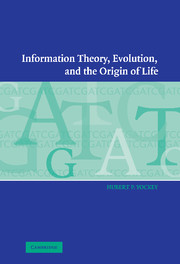Book contents
- Frontmatter
- Contents
- Preface
- 1 The genetic information system
- 2 James Watson, Francis Crick, George Gamow, and the genetic code
- 3 The Central Dogma of molecular biology
- 4 The measure of the information content in the genetic message
- 5 Communication of information from the genome to the proteome
- 6 The information content or complexity of protein families
- 7 Evolution of the genetic code and its modern characteristics
- 8 Haeckel's Urschleim and the role of the Central Dogma in the origin of life
- 9 Philosophical approaches to the origin of life
- 10 The error catastrophe and the hypercycles of Eigen and Schuster
- 11 Randomness, complexity, the unknowable, and the impossible
- 12 Does evolution need an intelligent designer?
- 13 Epilogue
- Mathematical appendix
- Glossary
- References
- Index
8 - Haeckel's Urschleim and the role of the Central Dogma in the origin of life
Published online by Cambridge University Press: 15 August 2009
- Frontmatter
- Contents
- Preface
- 1 The genetic information system
- 2 James Watson, Francis Crick, George Gamow, and the genetic code
- 3 The Central Dogma of molecular biology
- 4 The measure of the information content in the genetic message
- 5 Communication of information from the genome to the proteome
- 6 The information content or complexity of protein families
- 7 Evolution of the genetic code and its modern characteristics
- 8 Haeckel's Urschleim and the role of the Central Dogma in the origin of life
- 9 Philosophical approaches to the origin of life
- 10 The error catastrophe and the hypercycles of Eigen and Schuster
- 11 Randomness, complexity, the unknowable, and the impossible
- 12 Does evolution need an intelligent designer?
- 13 Epilogue
- Mathematical appendix
- Glossary
- References
- Index
Summary
I am in point of fact, a particularly haughty and exclusive person, of pre-Adamite ancestry descent. You will understand this when I tell you that I can trace my ancestry back to a protoplasmal primordial atomic globule. Consequently my family pride is something inconceivable. I can't help it. I was born sneering.
Pooh-Bah, The Mikado, Gilbert and Sullivan (First performed at the Savoy Theatre, London, England, March 14, 1885)Haeckel, Pasteur, and speculations on the origin of life in the nineteenth century
The origin of life has concerned philosophers, poets, and theologians since antiquity. With due respect to the early experiments, when chemistry had not yet emerged from alchemy, of Francesco Redi (1626–98) and Lazzaro Spallanzani (1729–99) on spontaneous generation, Louis Pasteur (1822–95) showed that properly sterilized cultures remained so, for years, without germs added from without (Pasteur, 1848, 1922a, 1927b). Reductionists have not challenged this in spite of considerable effort.
Haeckel's protoplasmal primordial atomic globules
Ernst H.P.A. Haeckel (1834–1919) claimed priority for the nineteenth-century notion that life originated by self-organizing biochemical cycles from colloids or coacervates generated from organic substances, Urschleim (primeval slime) in the early ocean.
- Type
- Chapter
- Information
- Information Theory, Evolution, and the Origin of Life , pp. 114 - 148Publisher: Cambridge University PressPrint publication year: 2005

